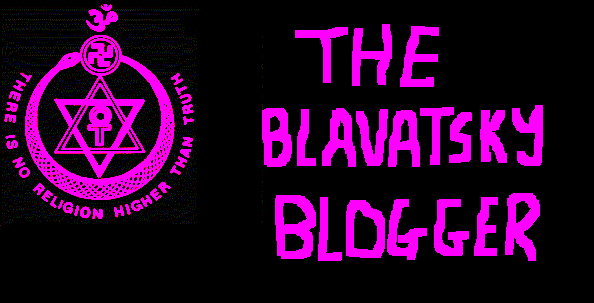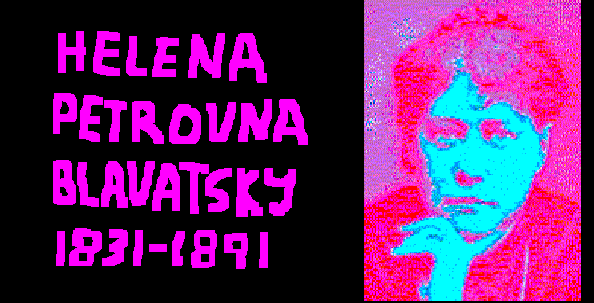Blavatsky Blogger

Taking Theosophical
ideas
into the 21st
century

I shall not want Pipit in Heaven:
Madame Blavatsky will instruct me
In the Seven Sacred Trances;
From T S Eliot’s “ A Cooking Egg” Published
1920.
With wasted opportunities and his marriage
to
childhood sweetheart Pipit having
burdened
him with stultifying family Karma,
a
failed intellectual turns to Esoteric Teachings
to
regain control of his destiny.
Posted

A Cooking Egg
Published 1920
En l’an
trentiesme de mon aage
Que toutes
mes hontes j’ay beues…
PIPIT sate
upright in her chair
Some
distance from where I was sitting;
Views of
the Oxford Colleges
Lay on the
table, with the knitting.
Daguerreotypes
and silhouettes, 5
Here
grandfather and great great aunts,
Supported
on the mantelpiece
An
Invitation to the Dance.
. .
. . .
I shall
not want Honour in Heaven
For I shall
meet Sir Philip Sidney 10
And have
talk with Coriolanus
And other
heroes of that kidney.
I shall
not want Capital in Heaven
For I
shall meet Sir Alfred Mond.
We two
shall lie together, lapt 15
In a five
per cent. Exchequer Bond.
I shall
not want Society in Heaven,
Lucretia
Borgia shall be my Bride;
Her
anecdotes will be more amusing
Than
Pipit’s experience could provide.
20
I shall
not want Pipit in Heaven:
Madame Blavatsky
will instruct me
In the
Seven Sacred Trances;
Piccarda
de Donati will conduct me.
. .
. . .
But where
is the penny world I bought 25
To eat
with Pipit behind the screen?
The
red-eyed scavengers are creeping
From
Where are
the eagles and the trumpets?
Buried
beneath some snow-deep
Over
buttered scones and crumpets
Weeping,
weeping multitudes
Droop in a
hundred A.B.C.’s.
__________________________
There is a
preface in French to the poem,
En l’an
trentiesme de mon aage
Que toutes
mes hontes j’ay beues…
which I
translate as “I enter my thirtieth year, shamed by wasted opportunity.” This
introduces the concept of Karma, the law of cause and effect. Action is
required to make something happen in one’s life and the speaker has clearly
been a man of inaction.
The poem
begins with a scene of domestic boredom in which the speaker is sitting with
his wife in silence. The book “Views of the Oxford Colleges” suggests an
aspirant but failed academic. A true
The
stillness of the opening scene again evokes a sense of inaction.
Later in
the poem the speaker refers to eating “with Pipit behind the screen”. In some
Victorian households, young children were set apart from the adults by a
partition at meal times. The “penny world” suggests treats from a tuck shop
which would in this case be eaten during a family visit. He has clearly known
Pipit since childhood.
The
description of the pictures of Pipit’s long gone ancestors and the line “An
invitation to the Dance”
indicate a marriage into a suitable family which emerged from a
limited social circle. There is a suggestion that the speaker has bought into
family Karma that is a seriously limiting factor on his aspirations.
The title
of the poem “A Cooking Egg” represents something that could become a living
sentient animal but instead was stifled before it could even begin to develop
its full potential.
The poem
enter a second phase in which the speaker rejects four things which are
limiting his aspirations and which he says he will not want in heaven. These
are Honour, Capital, Society and Pipit.
This is my
interpretation of what these represent;
Honour
(Respectability)
Capital
(The need keep up appearances)
Society (A
limited and judgmental social circle)
Pipit
(Karma)
The term
“heaven” can be interpreted on 3 levels
1)
As a
fantasy world into which the speaker escapes.
2)
As the
cycle of death and rebirth which will ultimately liberate the speaker and give
him new opportunities.
3)
As an student of Esoteric Teaching which will empower him to
take control of his destiny.
All three
are operational in the speaker’s life and I think that there is a good case for
the hypothesis that Eliot is portraying someone about to enter into the
spiritual path. The first three rejections show the speaker
on a par with people who have made things happen and have made an imprint on
the world. These doers contrast sharply with the speaker who is a man of
inaction. The fourth rejection represents the method by which the speaker will
raise his game.
All these
representations are light hearted on the “just think what I could do basis” of
a fantasist who probably does not realize what the spiritual path will involve.
The main point being made is that the speaker has realized that a life that
once offered so much has delivered so little and he has only himself to blame.
The
speaker mentions receiving instruction from “Madame Blavatsky”. Eliot was known
to have studied Theosophy and it is significant that he uses H P Blavatsky’s
name
The “Seven
Sacred Trances” although not a term that I have found in Theosophy represents
levels of development or consciousness and could also represent levels of initiation
within an Esoteric Group.
Piccarda de Donati probably
represents a personal teacher
The last
two verse of the poem expand the theme of great expectations coming to nothing;
“But where
is the penny world I bought”
shows the high hopes of naďve childhood years and a
suggestion that he never fully made the transition from childhood to adulthood.
“The
red-eyed scavengers are creeping
From
This may
be resentment directed towards people whom the speaker considers to be his
social inferiors, who have seized the opportunities that should have been his.
“Where are
the eagles and the trumpets?”
This line
conveys images of Roman Generals returning in triumph. This is contrasted with
“weeping multitudes” who “Droop in a hundred A.B.C.’s”. To the speaker you either live in victory
or in defeat, there is no middle ground. In his life he has failed to win first
prize in a world where there is no second prize.
(An A.B.C.
was a tea shop run by the Aerated Bread Company Limited.)
The
speaker shows at the end of the poem that the Karma of wasted opportunities
affects a vast section of the population.
A
Brief Biography of T S Eliot
______________________
The Blavatsky
Blogger
Taking Theosophical
ideas
into the 21st
century
__________________________
Postings
to this Website reflect
the
views of The Blavatsky Blogger.
Please
don’t go looking for anyone else.

